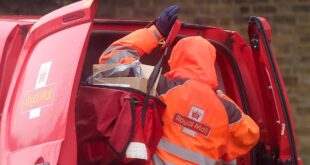- FCA is introducing new rules to protect access to cash
- Banks and building societies will have to assess gaps in local access to cash
- Some 3m people rely on cash FCA says
New rules for banks and building societies to protect access to cash for consumers and small businesses have been revealed by the Financial Conduct Authority.
The financial watchdog has been handed fresh powers by the Government to ensure reasonable access to cash withdrawal and deposits.
Under the new rules, banks and building societies must weigh up whether local communities lack access to cash services, like branches and ATMs, and provide additional services where they find ‘significant gaps’.
A significant gap in access to cash includes small towns in a remote areas where the last bank branch shut and there is a long distance to travel to the next town to visit a branch.
Vital asset: An estimated 3m people rely on cash according to the FCA
The new rules will come into force from 18 September. From that date, banks and building societies will have to:
- Assess cash access and understand if additional services are needed, when changes are being made to local services.
- Respond to local residents, community organisations and representative groups, who will be able to request an assessment of whether there are gaps in local cash access.
- Where significant gaps are found, deliver reasonable additional cash services
- Keep facilities, including bank branches and ATMs, open until any additional cash services identified are available.
The FCA said gaps in cash access could be filled with a range of measures, including banking hubs, ATMs (including deposit ATMs) and Post Office facilities.
A banking hub is a shared centre where customers of most major banks can go to withdraw and deposit cash and get banking support and advice.
They were created in response to widespread branch closures, with 6,000 bank branches having shut their doors since 2015.

Labour has pledged to roll out 350 banking hubs in towns and villages across Britain over the next five years.
The FCA’s new rules won’t prevent the closure of bank branches – but will have an impact where branch closures leave significant gaps in local cash access.
Fourteen banks and building societies have been designated by the Government to deliver this new cash access system.
The FCA has extended the period for banks and building societies to carry out cash access assessments, giving local communities more time to make their case.
Sheldon Mills, of the FCA, said: ‘Three million people continue to rely on cash, even as digital payments become more popular. And many small businesses still need somewhere to safely deposit their takings each day.
‘That’s why we’ve acted quickly in response to new powers given to us by Parliament to ensure reasonable access to cash withdrawal and deposits is maintained.’
Who relies on cash?
The volume of cash payments made each year in the UK fell by 65 per cent between 2015 and 2021, according to research from the FCA.
In the two years to June 2023, 1,358 bank and building society branches and 4,450 ATMs closed.
Around three million people are reliant on cash, according to the FCA.
The FCA found that being in a low-income household – those with an annual household income of less than £15,000 a year – and having low digital capability or access has the strongest association with reliance on cash.
Banking is changing, but as last week’s global IT outage shows, access to cash remains vital for consumers and businesses
The FCA found that being digitally excluded, which is measured through an individual having low digital capability or poor digital access, makes an individual over four times more likely to rely on cash than an individual who is not digitally excluded.
A person in a low-income household is almost three times as likely to rely on cash.
While being unemployed makes an individual almost twice as likely to rely on cash.
Adrian Roberts, deputy chief executive of Link said: ‘Over the past decade or more, while we have seen more people choose and prefer the convenience of banking and paying for things online, the inevitable consequence has been the reduction in the number of cash machines and bank branches.
‘Banking is changing, but as last week’s global IT outage shows, access to cash remains vital for consumers and businesses and the new regulations will help Link and the banks work together with the FCA to protect access to cash on the high street for years to come.
‘Today’s regulation is good news for consumers. Much has been achieved over the past couple of years, especially with the rollout of banking hubs and deposit services, but crucially this makes a voluntary arrangement, law.’
SAVE MONEY, MAKE MONEY

Investing boost

Investing boost
5.09% on cash for Isa investors

Cash Isa at 5.17%

Cash Isa at 5.17%
Includes 0.88% bonus for one year

Free share offer

Free share offer
No account fee and free share dealing

5.78% savings

5.78% savings
365 day notice account

Dealing fee refund

Dealing fee refund
Get £200 back in trading fees
Affiliate links: If you take out a product This is Money may earn a commission. These deals are chosen by our editorial team, as we think they are worth highlighting. This does not affect our editorial independence.



